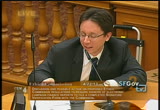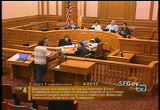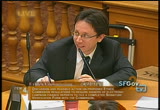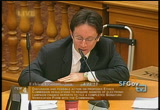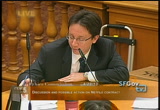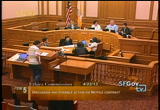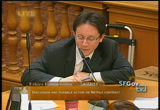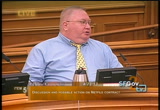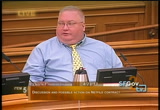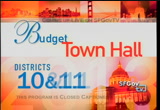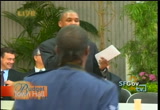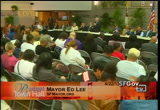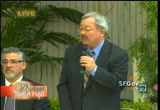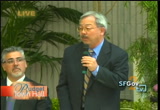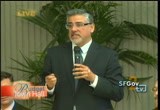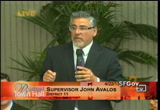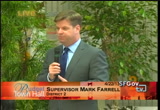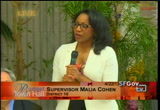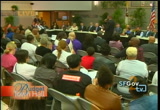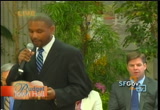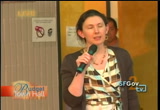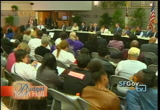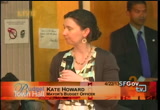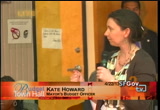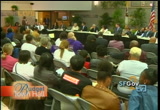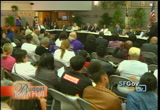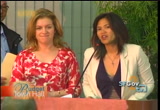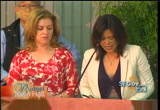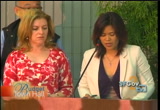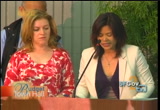tv [untitled] April 22, 2013 6:00pm-6:30pm PDT
6:00 pm
gives their pin number to someone else - in san diego there's no way on behalf of the candidate that they would keep their information secret >> we may have to implement a process where you'll have to change our id information. we'll want to monitor it and we can institute further things to keep information save >> if i might. for a candidate controlled committees where a candidate has to sign and the treasurer has to sign there maybe multiple committees were not the same
6:01 pm
treasureor for that candidate so will candidates and treasurers be independently be able to sign off and not be identified? and i'm thinking through that. >> so one of the reasons we developed this to separate the signers from the committee. and there's a committee account and the filing is created in that account usually by the treasurer and each individual will have to check in and for instance the information will
6:02 pm
stay in a file until sent out. anything else? >> is there a motion to approve this? i move to approve that change to the sequa regulation. >> second. >> all in favor? okay. the motion passes. another computer issue we're going to be discussing and on net files contracts the renewal of that >> so the commission has a contract with net file which is our electronic filing vendor and that contract will end in september of this year. the contracting process in this city is very length yes and
6:03 pm
requires approval by the civil serve commission. it is - the commission has previously entered into two contracts to provide the system for finance statements lobbyist statements and statements of economical interests. it's the only vendor that the state has approved so we only have one system and the system is shared by 20 industries that lowered our maintenance costs and allowed us to improve the system. there are a brief memo and i'll
6:04 pm
answer any questions about it. m >> this memo represents a lot of time we spent on that. we do get some benefits and we think about that carefully as we plan ahead so the negotiations are crafted very careful. the city has a lot of requirements and we go through a lot of hurdles and hoops so this represents a significant amount of time and care >> i have some questions. first of all, thank you for your your hard work and electronic system and thank you for your
6:05 pm
work. i.e.. a little confused about this particular me up 0 it's not clear we have a viable alternative. so what really are you asking? so >> so prior to 2007 from about 1999 to 2007 the city co- could file one finance form. that then a department came to the commission and a announced they were discontinuing the practice in the commission. and they had net file that wouldn't rebuild the system because it was going to cost a
6:06 pm
lot of money >> we don't have any additional. if the commission decided i didn't want to go in this decision staff would very quickly have to come up with an alternate and we wouldn't know what to do. >> we could say this isn't working for us but it is. >> what about the cost? >> for the first time we've maintained costs for 6 years static. in this it's going to go up. i think that net file has been for bearing to ask for more
6:07 pm
because the city has made strong pleas to the contractor of the city to recognize the budget and they've sort of recognized that. and another one is that by working with us to develop several different platforms set of xablts we've enhanced their ability to sell the product in other cities so it's compensation for it but the reality of inflation it's not really feasible for them to give us what is ultimately a discount. and what we're looking at is we're asking for more so the costs will increase >> and do we know how many?
6:08 pm
6:09 pm
good evening everybody, welcome. we have a packed agenda tonight. first we want to thank the southeast community facility commission for opening their doors tonight and their executive director, moses. thank you for opening the doors tonight. we have a very, very tight agenda. the goal here is for the community to be heard. this is not a question and answer time, but the goal is for the community to be heard. when we get to public comment, and you make your statements. remember we want you to be as concise as possible, because the department heads and the mayor are here to hear you.
6:10 pm
without further ado, i want to introduce mayor lee and he will open us up. thank you. good evening everybody. as stated eloquent ly, this is time for all of you in the community particularly focused residents of 10 and 11, to tell us in government what you feel passionate about. i want to thank supervisor avalos and supervisor cohen that it will be here in a minute. your budget chair is supervisor farrell, i want to thank him as he will have a lot of meetings. and i want to thank the different departments represented here. you can see them, we will have a chance to identify them in a minute. again we will give priority of time to the residents, to the nonprofits, to people who work
6:11 pm
here in the community in district 10/11, to express what you think our budget should reflect. this is an important part. this is the second of at least five or six we are doing throughout the city. to give people the opportunity to tell us what their priorities are. and then we will work those into how we make decisions about our budget in the city. i wanted to begin by saying we are better and better each year. doesn't mean we don't have a deficit. we still have a deficit in the budget. this year coming $123 million, and the second year in the budget covering 2014/15 has $256 million deficit. we are not out of woods. but these numbers are better than $500 million and $700
6:12 pm
million budget deficits that we used to have a few years ago. our city is doing better. we are concerned about how to fulfill that deficit. but we are also concerned about what is happening to seniors, what is happening to youth. what is happening to families. our open space. our small businesses. our environment. we are all concerned about that as well. of course i must say about our housing authority as well. so we are taking on a lot of responsibility and because we are and because we are very busy doing the work we are. sometimes we need your input to steer us in the right direction for what things you think are important. so we are open to that. and we want to hear from you tonight. enough speeches. let's get on with it. may i have a couple words from
6:13 pm
supervisor avalos and farrell. >> thank you. thank you mayor lee, and yes, i get to make a speech too. i am supervisor john avalos, i represent district 11, just over the hill. i want to thank the mayor and the department staff for being here. and i want to thank supervisor farrell, the chair of the budget committee to be here. he's got a very difficult task. but one that he will have help with colleagues on the budget committee and we will be joined by supervisor cohen as well. i have talked incessantly of needing a budget based on equity, on neighborhoods and their needs. in district 10 and 11, we have the most unique neighborhoods. we have a large senior population and youth population.
6:14 pm
and we have to look at our budget to support seniors and young people as best we can. we have growing disparities in san francisco and as the economy is growing and we lift all through the economy. and ways to have programs that reach into the community that provide opportunity for young people. and to have appropriate housing, that's something i am committed to. i want to hear your ideas of how to do that and strengthen the efforts. last year in district 11 we were able to fund projects for the parks and safety and to beautify the environment. and we had projects for young people as well. i want to grow in the commitments we made last year. we know the best way to support our young people with opportunity is to provide jobs for them.
6:15 pm
i am looking forward to see how to accomplish that with the mayor and my colleagues from the board of supervisors, thank you. >> thank you, supervisor avalos. i am mark farrell, i am the supervisor from district 2 and i am the chair of the budget committee. and it's an honor to be here with the mayor and supervisors. my priorities is to have an open and transparent budget process, that's why we are here. we are doing six of these town halls and we want to hear from each of you. and secondly to manage our budget in a fiscal and responsible manner. and lastly having a budget that reflects the priorities of all san franciscans, there are so many things needed in our
6:16 pm
neighborhoods and communities. and we want to address that in the budget. thank you for being here, and i want to be this night is about hearing you. i will turn it over to supervisor cohen. >> good evening, everyone, it's good to see you. the number one thing we need to keep in mind here, that the budget is one of the most single pieces of legislation that the board of supervisors pass. our budget is $7.4 million -- excuse me, billion -- that's what i said, billion, people. clean out your ears. i would never short change san francisco and say million [laughter] so you know what, i want to thank you for having such a healthy turn-out. this audience looks look and we have a good moderator.
6:17 pm
thank you for leading this discussion. last year we made significant investments in public safety back-filling investments that were previously made by the redevelopment agency, economic development and support for small business. this year i would like our city to make changes in education, and transportation and lighting and other quality of life issues that have a significant impact in district 10. i am looking forward to hear from each of you, those unable to get an opportunity to speak to the mic. you are more than welcome to call our office or e-mail the office with your suggestions for the budget priorities. thank you. >> mayor lee, and supervisor avalos and supervisor farrell. before we continue on, i want to remind everyone if you wish to speak, get comment cards from the outside. they will come around to collect
6:18 pm
the comment cards. i will briefly run through the agenda, and everyone be mindful this is a district 10 and district 11 budget town hall meeti meeting. we would work hard to give equitab equitable priority to each, district 10 and 11. we will have a brief budget overview by kate howard, the mayor's budget director and we will have community organizations and then public comment. we will keep our comments to two minutes. and the cards will be collected. we will start with speaker 15, and if possible, we will try to give more people a chance to speak. but we will definitely allow for 15 speakers. and then hear from supervisor farrell, who is the chair of the board of supervisors budget
6:19 pm
committee and then closing remarks by district 10 and 11, supervisor cohen and supervisor avalos. a smooth process. first kate howard will give a presentation, mayor's budget director. >> good evening, everybody. how are you? nice to see you here tonight. i am kate howard, i am the mayor's budget director. i thought i would give you a brief overview of our city's budget. as supervisor cohen pointed out, the budget is one of the most important laws that san francisco passes. it's a law of our source and how we spend it. and it's a plan that sets our priority. so it's important for us to hear
6:20 pm
from you what those priorities ought to be. i have here on my right, your left, a series of charts that show you a little bit more about san francisco's budget. overall the city's budget is about $7.4 billion annually. that includes all the funds we have to spend. all the city functions and the county functions and the airport and our police department and fire department and human services agency and our health department. you can see the next chart shows you where we get most of our money. so we spend a lot of time in san francisco talking about how to balance the budget. and we tend to focus that balancing conversation on what we call the general fund. those are the funds that the city has discretion over. in terms of making policy choices on what to spend money
6:21 pm
on and what to cut. where do we get our money? the biggest resource for san francisco and property taxes, it's over $1 billion a year. and we receive significant revenues from the business taxes and sales tax and hotel tax as well as other local sources. also important to know that about one out of every five dollars that san francisco spends comes from the state and federal government. when the federal government does things like implement a federal sequester. that has an impact here on san franciscans. if the state budget changes, that has an effect here on us. it's important to know that we have control over some of our revenue but not all of them. the mayor shared with you our five-year budget outlook. and mentioned the first two years. this is the fourth chart over with the red and black.
6:22 pm
the red bars show you how much our expenditures are projected to grow in the next five years and the black bars. we project over the five years we will have 13% more revenue, it's a strong economy. and at the same time our expenditures are expected to grow by 25%. so the gap between the growth in expenditures and revenue is what creates our budget short falls. a significant part of that pressure is related to pressure related to labor costs. including the cost of our health benefits, and retiree benefits. finally i wanted to share, we will hear from you about your experiences, your priorities and information that you think is important for these policy makers to hear. one of the ways we have to hear
6:23 pm
information directly from the community is through 3-1-1. we pulled together a chart that shows the most prominent calls from 3-1-1 from districts 10 and 11. we hear significant calls related to street and sidewalk cleaning. followed by graffiti and requests related to the housing authority. for district 10 the calls related to the housing authority were more significant. and for district 11 the calls related to abandoned vehicles were more significant. and it would be helpful to hear from you if those are consistent with your experience. and i want to let you know who else is up here today. we have -- i will name the departments, office of economic and workforce development. we have public library. city administrator's office.
6:24 pm
fire department. department of ageing and adult services. the human services agency. the department of child support services and adult probation department and controller's office. and we have elected officials that introduced them. the public utility commission and rec and park department, mta, department of building inspection, the health department. and san francisco public housing authority. department of emergency management. department of public works. office of small business and mayor's office of disability. we have a number of officials from the san francisco police department who are here as well. that's all i have. we look forward to hear from you. >> okay. if you have comment cards and they are ready, can you just hold them up. we have our team that will grab
6:25 pm
your cards. please hold them up. at this time we will have representatives from two district 10 organizations, daphne mcnowel and stacy bartnet and the asian community center, david chan. if you could come to the microphone. >> hi-- okay. good evening, my name ir daphne mcnowle, and this is stacy barltlet. we are parents at daniel webster and petrillo hill.
6:26 pm
we are here to talk to you about supporting efforts to keep families in san francisco. it's well documented that one of the san francisco's greatest challenges is retaining middle-class families. the two reasons for family flight is affordable housing and public schools. i would like start by telling you the story of our school. back in 2005 the san francisco school district slated daniel webster for closure. at the time it was underenrolled and in the dire need of repair and of being isolated. a group of parents, their kids just babies, rallied the neighborhood and convinced the board of education to keep the school open. today it's a magnet for families of our attendance area. it started with incredible
6:27 pm
capable parents, now daniel webster has a pre-school onsite, and emersion program and requests on the rise. it's integrated portraya al of petrillo hill. what a san francisco family success story, we have demonstrated how a high quality, integrated public school can overcome family flight. there are a couple of articles in the chronicle that document our success. we are here to tell you that the successful model is in jeopardy. daniel webster doesn't have a viable middle school and we don't have enough seats to follow us. the way to continue our success is to make daniel webster a
6:28 pm
pre-k to 8 school but we need your help. a year-and-a-half ago we made a request to expand daniel webster. and it's been two years since we raised this decision and a decision still has not been made. the district should be able to accommodate for growth. with mayor lee's support the city is experiencing a tech boom. we need family-friendly housing and schools nearby. the housing is coming online,
6:29 pm
more than 10,000 residential units are developed over the next five years. what we don't have is enough school seats for the right configuration. we are asking for the weight and the influence of the city and its leaders to urge sfusb to adopt our pre-k to 8 proposal. we all have a stake in this, it aligns with san francisco's racial and cultural mission and keeps families here. >> please forgive me for not keeping track of time. but we want to be equitable and everything we have to say is important, but working together is to be mindful of that moving forward. >> mr. chen. >> how time flies.
47 Views
IN COLLECTIONS
SFGTV2: San Francisco Government Television Television Archive
Television Archive  Television Archive News Search Service
Television Archive News Search Service 
Uploaded by TV Archive on

 Live Music Archive
Live Music Archive Librivox Free Audio
Librivox Free Audio Metropolitan Museum
Metropolitan Museum Cleveland Museum of Art
Cleveland Museum of Art Internet Arcade
Internet Arcade Console Living Room
Console Living Room Books to Borrow
Books to Borrow Open Library
Open Library TV News
TV News Understanding 9/11
Understanding 9/11